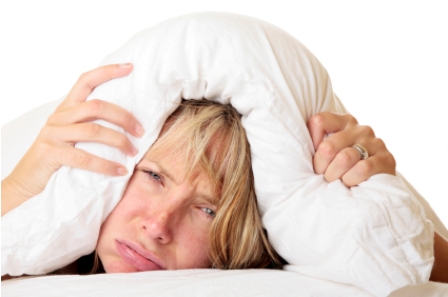 Insomnia is very common, affecting approximately 12% of the population. Having a good nights sleep is one of Mother Nature’s major ways of helping us to repair and rejuvenate our bodies. Without good quality, regular sleep the body can start to experience all sorts of negative effects. The longer it goes on the more serious it becomes.
Insomnia is very common, affecting approximately 12% of the population. Having a good nights sleep is one of Mother Nature’s major ways of helping us to repair and rejuvenate our bodies. Without good quality, regular sleep the body can start to experience all sorts of negative effects. The longer it goes on the more serious it becomes.
Why We Don’t Sleep
There are many reasons we may not get a good nights sleep, the neighbors keep you awake with their rowdy parties, it might be too hot or too cold, your partner may snore…. the list goes on! However insomnia is quite different, if you have trouble falling asleep or staying asleep without any external disruption, such as noisy neighbors waking you up, you are experiencing insomnia.
Effects of Long term Interrupted Sleep
There’s a good reason sleep deprivation has been used as a form of torture, ask any new parent! But seriously, ongoing sleep deprivation or insomnia has some very real physiological changes associated with it, including;
Immunosupression
Many people don’t realize that ongoing insomnia or sleep disruption can have a direct effect on the state of their immune system. Clinical studies have shown that people with chronic insomnia have an altered immune defense with lowered levels of important immune cells, including CD3+, CD4+ and CD8+.
Melotonin, an important neurotransmitter associated with sleep, plays a vital role in the regulation of other important immune cells such as Th1 cells and monocytes. Melotonin is produced in the pineal gland, gastrointestinal tract and retinas. Having enough melotonin helps you to get a good nights sleep and helps to ensure healthy immune function.
Depression – The Chicken or the Egg?
Insomnia and sleep disturbance is one of the key signs of depression and ironically ongoing sleep disruption has been clearly linked to depression. We have different stages of sleep including, slow wave, REM (rapid eye movement) and non REM stages. Each stage is important to normal, restful sleep. Disrupted timing of the REM stage of sleep known as a maker of serious depression in clinical studies. The REM stage is considered our most active dreaming state and it seems it is essential in helping us process life events and the emotions we experience. Having disrupted REM sleep is believed to have an effect on the adrenal gland, leading to compromised stress response and an inability to cope with stress.
Stress Response
It has been clinically proven that an elevated stress response, which causes an increase in cortisol and catecholamine output, is correlated with insomnia. Sometimes our lives can get so busy we don’t even realise we are living on adrenalin just to get us through. This type of stress knocks our HPA (hypothalamus-pituitary-adrenal) axis off kilter and revs up our sympathetic nervous system contributing to insomnia. It’s a bit of a vicious cycle really, the less you sleep the poorer you resilience to stress becomes, causing more insomnia, and on it goes, creating a negative feedback loop that is hard to break. So if you have got too much on your plate and are trying to juggle too much at once, your sleep will definitely be affected.
Take some steps to manage your stress – here’s some ideas:
* Relaxing massages
* Regular exercise
* Just say no – clear your books and give yourself some down time if possible
* Talking to friends or family
* Get some professional support
* Meditation
* Yoga
 What Can You Do About It? – Simple Steps to Sleep Easy
What Can You Do About It? – Simple Steps to Sleep Easy
Retrain your sleep/wake cycle – This is an easy way to start helping your body regain a more natural rhythm. Make sure you have exposure to bright early morning sunlight. First thing in the morning is absolutely the best time of day to get some sunlight and exercise. Be consistent – get up at the same time each day (even on the weekends!) and go for a walk outside. Another part of retraining your sleep wake cycle is to go to bed at around the same time each night.
Ban the Box – Avoid having a television in your bedroom and watching or reading anything too stimulating at night before you plan to go to sleep.
Magnesium – This important nutrient helps the body to relax and is an important cofactor in the production of Melatonin. It is found in many foods including green leafy vegetables, whole grains and nuts. Although dietary sources are important, if you have insomnia see your practitioner who will recommend a suitable high strength magnesium supplement to really help you relax and get a good nights sleep.
B Group Vitamins – particularly vitamin B12 plays a role in the development (if you are deficient) and treatment of insomnia. B group vitamins are important for a healthy stress response and sleep. The are elderly, stressed and vegetarian/vegan populations are often found to be deficient in B group vitamins. One thing to remember is that taking a B group vitamin at night may actually keep you awake – so take them in the morning.
Tryptophan – this amino acid is a precursor to serotonin (a neurotransmitter associated with mood regulation) and plays a key role in sleep regulation. Tryptophan is found in turkey, chicken, dairy products, oats and wheat germ. Complex carbohydrates before bed also tends to support Tryptophan, so having complex carbohydrates with dinner will also help. Thrytophan needs various micro nutrients to perform it function including B6, magnesium and folate in the diet. Several natural medicines specifically designed to promote sleep are formulated to support Tryptophan metabolism. Get some professional advice on the most appropriate treatment for you.
 Things to Avoid – include, caffeine, cola drinks, alcohol, spicy foods, sugary or high GI foods. High GI foods such as sugar, alcohol and refined carbohydrates can cause a hypoglycaemic response during the night that may disrupt sleep.
Things to Avoid – include, caffeine, cola drinks, alcohol, spicy foods, sugary or high GI foods. High GI foods such as sugar, alcohol and refined carbohydrates can cause a hypoglycaemic response during the night that may disrupt sleep.
Herbs – there are many herbs that will help clam the nervous system and relax the body these may include Hops, Chamomile Oats, Skullcap, Melissa and Zizyphus. Valerian is a herb commonly used to promote sleep – there is a small percentage of patients who actually have the opposite effect from this herb so best to get your herbs professionally prescribed. Other tonic herbs help to regulate the stress response and promote sleep such as Withania.
Professional Advice – A qualified Herbalist or Naturopath has many tools both nutritional and herbal, to help you get a good nights sleep, so get some professional advice and get some sleep!

